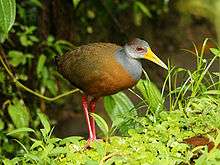Rufous-naped wood rail
| Rufous-naped wood rail | |
|---|---|
 | |
| Rufous-naped wood rail | |
| Not recognized (IUCN 3.1) | |
| Scientific classification | |
| Kingdom: | Animalia |
| Phylum: | Chordata |
| Class: | Aves |
| Order: | Gruiformes |
| Family: | Rallidae |
| Genus: | Aramides |
| Species: | A. albiventris |
| Binomial name | |
| Aramides albiventris Lawrence, 1868 | |
| Subspecies | |
|
See text | |
| Synonyms | |
|
Aramides cajaneus albiventris Russet-naped wood-rail | |
The rufous-naped wood rail[1] or russet-naped wood rail[2] (Aramides albiventris) is a species of bird in the family Rallidae. It lives primarily in forests and mangroves of Central America.
Description
.jpg)
The rufous-naped wood rail measures 38 cm (15 in) long and weighs 460 g (16 oz). The upperparts are olive green to dark brown. The head and neck are medium-grey, blending into a brown patch at the back of the head. The eyes are red. The chest and flanks are rufous. The belly, rump and tail are black. Legs are coral-red. Males and females are similar. Immatures are similar to adults but belly sooty-black, flecked with buff. It used to be considered a subspecies of the grey-necked wood rail.
Subspecies
- A. a. mexicanus — Bangs, 1907 — in southern Mexico
- A. a. albiventris — Lawrence, 1867 — from the Yucatán to Belize and into Northern Guatemala
- A. a. vanrossemi — Dickey, 1929 — from southern Mexico (Oaxaca) to southern Guatemala and into El Salvador
- A. a. pacificus — A. H. Miller & Griscom, 1921 — on the Caribbean slope of Honduras and Nicaragua
- A. a. plumbeicollis — Zeledon, 1888 — in north-east Costa Rica
Distribution and habitat
It is found in Belize, Costa Rica, Guatemala, Honduras, Mexico, and Nicaragua. Its natural habitats are subtropical or tropical moist lowland forests, subtropical or tropical mangrove forests, subtropical or tropical swamps, and swamps.
References
- ↑ "AOU Species Updates". Retrieved 30 Sep 2016.
- ↑ "IOC Species Updates". Retrieved 30 Sep 2016.
- Marcondes, R.S., and L.F. Silveira. 2015. A taxonomic review of Aramides cajaneus (Aves, Gruiformes, Rallidae) with notes on morphological variation in other species of the genus. ZooKeys 500: 111-140.